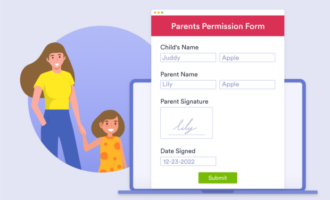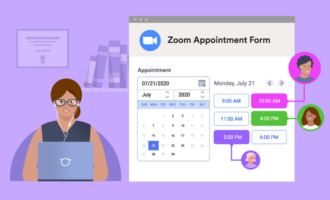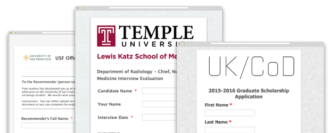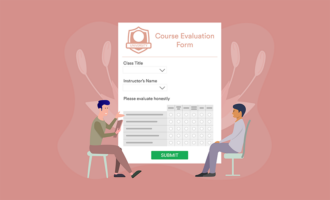If you’re an educator who wants to improve your courses and your students’ learning experience, then you’re likely interested in implementing course evaluations to collect student insights and feedback.
The data you gather from this process will help you identify and assess any gaps in teaching methodology, course structure and materials, and your own performance — all with an eye toward making improvements that will enhance student learning and satisfaction.
No matter which teaching environment you find yourself in — a school, college, university or other educational setting — the course evaluation is an essential tool for making your classes more effective.
See how GGU School of Law utilized course evaluations to gather valuable feedback. Learn from their experience to enhance your own course evaluations with school forms.
The purpose of course evaluations
Educators use course evaluations as a way to ask students a series of questions at the end of the semester or term to gauge the quality and effectiveness of a course. Once these are complete, administrators and instructors review and analyze the feedback from evaluations to identify course and instructor strengths, weaknesses, and areas for improvement.
Course evaluation example questions
Obviously, to get useful feedback from your course evaluations, you have to ask the right questions. When you’re developing your questions, it’s helpful to focus on four key areas: course structure, instructor performance, materials, and student satisfaction with the course.
Here are 35 course evaluation examples and common questions to get you started in each of these four categories.
1. Course structure
Designing and structuring a course effectively is as important as teaching effectively. Here are some evaluation questions to help you understand how your course structure impacts student learning and results.
Students can answer these and the following questions by indicating their level of agreement on a scale: strongly agree, moderately agree, neutral, moderately disagree, or strongly disagree.
- This was a well-organized and structured course.
- The instructor presented the course material in a logical sequence.
- The course followed the syllabus.
- The course structure helped me learn and understand the course material.
- Course assignments and lectures were well balanced.
- The course covered everything laid out in the course description.
- Exams and projects accurately measured my knowledge of the course material.
- The course requirements and assignments were appropriate for the course level.
2. Instructor performance
These course evaluation questions are related to the instructor. They’re meant to capture insight into the instructor’s effectiveness, teaching approach, knowledge of the course material, clarity in explaining course material, and more.
- The instructor was knowledgeable in the course subject matter and well prepared for each class.
- The instructor clearly explained the course material.
- The instructor was available to answer questions and discuss concerns.
- The instructor was available for office hours outside of class.
- The instructor presented the course material in a way that was accessible.
- The instructor encouraged class participation.
- The instructor provided valuable feedback on my assignments.
- The instructor returned papers, assignments, and exams in a timely manner.
- Grading procedures were clear, and I understood what the instructor expected of me on each assignment, paper, or exam.
- The instructor showed a genuine interest in helping students learn.
- The instructor treated students with courtesy and respect.
3. Course materials
These questions are meant to determine if course materials complement each other and advance course objectives in a logical, accessible manner.
- Course materials, including books, readings, handouts, study guides, software, multimedia resources, online content, and other instructional materials were readily available.
- The course materials increased my knowledge of and skills in the subject matter.
- The course materials were up to date and included the latest information.
- There was a good balance of tests, assignments, and papers with lectures and in-class instruction.
- Course assignments helped me deepen my understanding of the subject matter.
- The course website or learning management system (LMS) was up to date and useful.
- The course materials were appropriate for the education level of the class.
4. Student satisfaction
These questions are meant to assess and understand the student experience.
- I would recommend this course to other students.
- I would recommend this instructor to other students.
- This course met my expectations.
- This course advanced my understanding and knowledge of the topic.
- Class sessions were useful and interesting.
- This course was helpful in my progress toward my degree.
- This course improved my critical-thinking skills.
- I made the right decision in taking this course.
- I am satisfied with the instructor’s approach and teaching methodology.
Jotform resources for the course evaluation process
Ready to get started on developing your course evaluations? Jotform makes it easy to navigate the course evaluation process with our free course evaluation form, student course evaluation form and course instructor feedback form templates.
Simply choose any form and fully customize it to meet your needs with our drag-and-drop form builder — no coding required. You can easily share the form via a link in an email or by embedding it on a website to allow students to provide feedback on any device.
Then you can monitor all the data you’ve gathered with Jotform Tables. It’s the ideal tool for collecting, organizing, and managing data in an all-in-one workspace, perfect for when a spreadsheet isn’t enough.
Once you gather and assess evaluation results, the next step is to use that information to improve your course. You can get a head start on the next semester by using our free online pre-class survey. And if you need to determine how well your students are prepared for your course, our handy pre-assessment questionnaire can help you gather the information you need.
In addition to these free resources, Jotform has special pricing plans for educators.
Get started with our data collection tool today and receive a 50 percent educational discount for any paid plan. With the discount, the Bronze plan is just $17 per month and includes 25 forms and 1,000 monthly submissions. The Silver plan is $19.50 per month and expands your limits to 50 forms and 2,500 monthly submissions. And the Gold Plan is $24.50 per month and gives you 100 forms and 5,000 monthly submissions.
We also offer a 30 percent discount on Jotform Enterprise for educational institutions. Jotform Enterprise is a powerful, secure platform that allows you to create a comprehensive school-management platform to fit your needs.
Course evaluations are a great tool for measuring performance and helping educators improve the student learning experience. The questions here are just a few among many you could ask. The important thing is to seek student feedback and implement your findings so you can effectively engage your students and help them learn.
Photo by fauxels









































































































Send Comment: